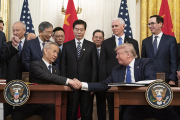
The curtain has fallen on the Sag-Aftra film and television actors' strike in Hollywood after four months, with a tentative deal offering actors increased minimum-pay, a streaming bonus, and
provisions for "consent and compensation" against AI. The resolution, although welcomed, leaves questions about the enforcement of the AI-related provisions. Hollywood, often seen as the epitome of free-market principles, witnessed a notable strike, challenging preconceived notions and generating favorable public support.
The cinematic tradition of portraying unions and their activities as compromised finds resonance in Hollywood's history, from Marlon Brando in On the Waterfront to Sylvester Stallone in FIST and Peter Sellers' Hitler-moustached shop steward Fred Kite in I'm All Right Jack. Despite rumors suggesting studios may have used the strike as a guise for production cuts, Hollywood's creative cow appears to be in good shape.
For the moviegoing public, the immediate impact may be less pronounced compared to the US writers' strike, which led to the suspension of talk shows. Productions, including Deadpool 3, Gladiator 2, and Wicked, can reportedly resume, and delayed films like Dune: Part Two can be scheduled for release. However, the unblocking of sequels and adaptations does not signal an immediate resurgence of creativity or the storytelling industry leaders often emphasize.
During the strike, Hollywood actors were restricted from making promotional appearances, altering the dynamics of talk shows. While British TV audiences might not have noticed significant differences, there has been a shift towards non-film-promotion celebrity appearances. The absence of group appearances, where multiple film stars dominate talk show sofas, has provided relief from what is often perceived as an advertorial for their films.
Throughout the strike, Hollywood stars were permitted to appear publicly under the guise of producers. Film festival selectors reportedly favored movie stars' "passion projects," anticipating their red-carpet appearances as producers. This leniency, exemplified by Chris Pine and his film Poolman, could now revert to a more conventional landscape. With the strike concluding, streamers and studios are expected to recalibrate, encouraging performers to stay within their roles, yet acknowledging the industry's continued lucrativeness and actors' resilient position within it.











































